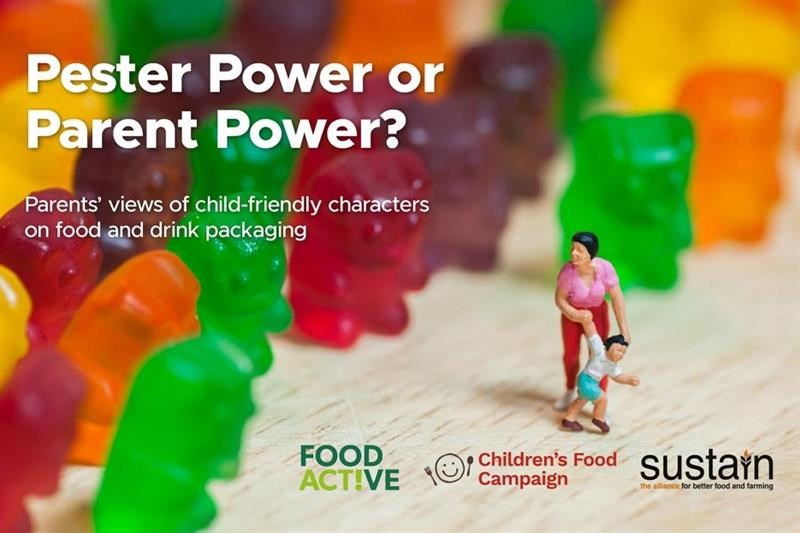Quit using cartoons to sell unhealthy snacks, say parents
Published: 16/07/2020
Parents want to see an end to the use of popular children’s characters and brand mascots on food and drink high in fat, salt and sugar.
That's according to a new report Pester Power or Parent Power? published today (16 July).
The report is based on research with 942 parents of children across the UK conducted by the Children’s Food Campaign and Food Active, with support from the Guy’s and St Thomas’ Charity. The campaign organisations are calling on the Government to consider regulating the use of child-friendly characters on less healthy food and drink packaging as part of the next stages of its childhood obesity action plan.
- 9 in 10 (91%) of the 942 parents taking part in the research say that the use of child-friendly characters on food and drink leads to their children requesting or pestering for those products.
- More than 8 in 10 (84%) parents said characters should be removed from unhealthy sweets, confectionery and snack products
- Nearly 7 in 10 (68%) agreed that the use of children’s characters makes it more difficult to feed their children a healthy diet.
Parents reported how popular characters from TV and films have a powerful effect on the food and drink their children notice and ask for. Whilst parents do not always give into children’s pestering, many agreed that using these characters often makes their parenting job more difficult, especially if they take their children shopping with them.
Rachel Allen, a mother of two in London, said: 'It would be really helpful if children’s food marketing (i.e. use of characters) could be swayed towards healthy foods (i.e. fruit, vegetables, no added sugar yogurts etc). It is really not helpful when you end up having a battle of wills in the supermarket over Paw Patrol chocolate sticks.'
Whilst parents are most likely to prioritise price, brand and perceived health of products when shopping for themselves, many reported that the use of characters is the most powerful marketing tool for attracting their children’s attention towards specific products or brands, and can divert the choices they make as a parent.
Lindsey Stephenson, a mother of two in the North West, said: 'I took part in this survey because I felt it was important that, as a parent, my voice was heard. Those who are allowing manufacturers and big brands to market to children should know the pressure they are putting parents under. Healthy choices need to be easy choices, but it’s a minefield out there. I want a little more understanding and empathy - so many decisions are made with no idea of what it’s like to go around Asda with a screaming child, all because there was a cartoon character on a rice crispy bar.'
The report notes that whilst advertising rules currently prohibit the targeting of children through the use of popular cartoon characters or celebrities in advertising for products that are high in fat, salt and/or sugar (HFSS), there is still a major loophole in that regulations which do not apply to food and drink packaging.
Earlier this year, supermarkets Lidl and Asda joined Tesco and Sainsbury’s in committing to the removal of child-friendly cartoon characters from breakfast cereal high in sugar. Both the Parliamentary Health Select Committee and the former Chief Medical Officer have previously called for the use of child-friendly characters on HFSS food and drink to be prohibited.
Barbara Crowther, co-ordinator of the Children’s Food Campaign, said: 'Parents are clear – whether it’s Peppa Pig or Paw Patrol, Disney or Star Wars, or the brands’ own cartoon mascots, they have no place on the packaging of unhealthy food and drink. They confuse and undermine parents in trying to feed a healthy diet to their families, and cause unnecessary tension. Whilst there’s been some progress on breakfast cereals in some supermarkets, it’s not nearly enough. This is why we are calling on the Government to consider regulations to restrict their use to healthier food and drink only.'
The Pester Power or Parent Power? report is released as the Government prepares to launch a new drive to tackle both adult and child obesity, especially in light of evidence of increased risk of negative outcomes if infected with viruses like Covid-19 for those affected by overweight and diet-related diseases such as Type2 diabetes or heart disease. The report contains a series of recommendations for both government and industry, which include refocusing any use of children’s characters towards healthier food and drink, as well as making front-of-pack colour-coded nutritional labelling mandatory. The organisations are also calling for products high in fat, salt and sugar to be removed from children’s eye-level on shelves and from store entrances, aisle ends and checkout areas where children are most likely to see them.
Author: Julie Bissett



.jpg?width=300&height=200&scale=canvas)









